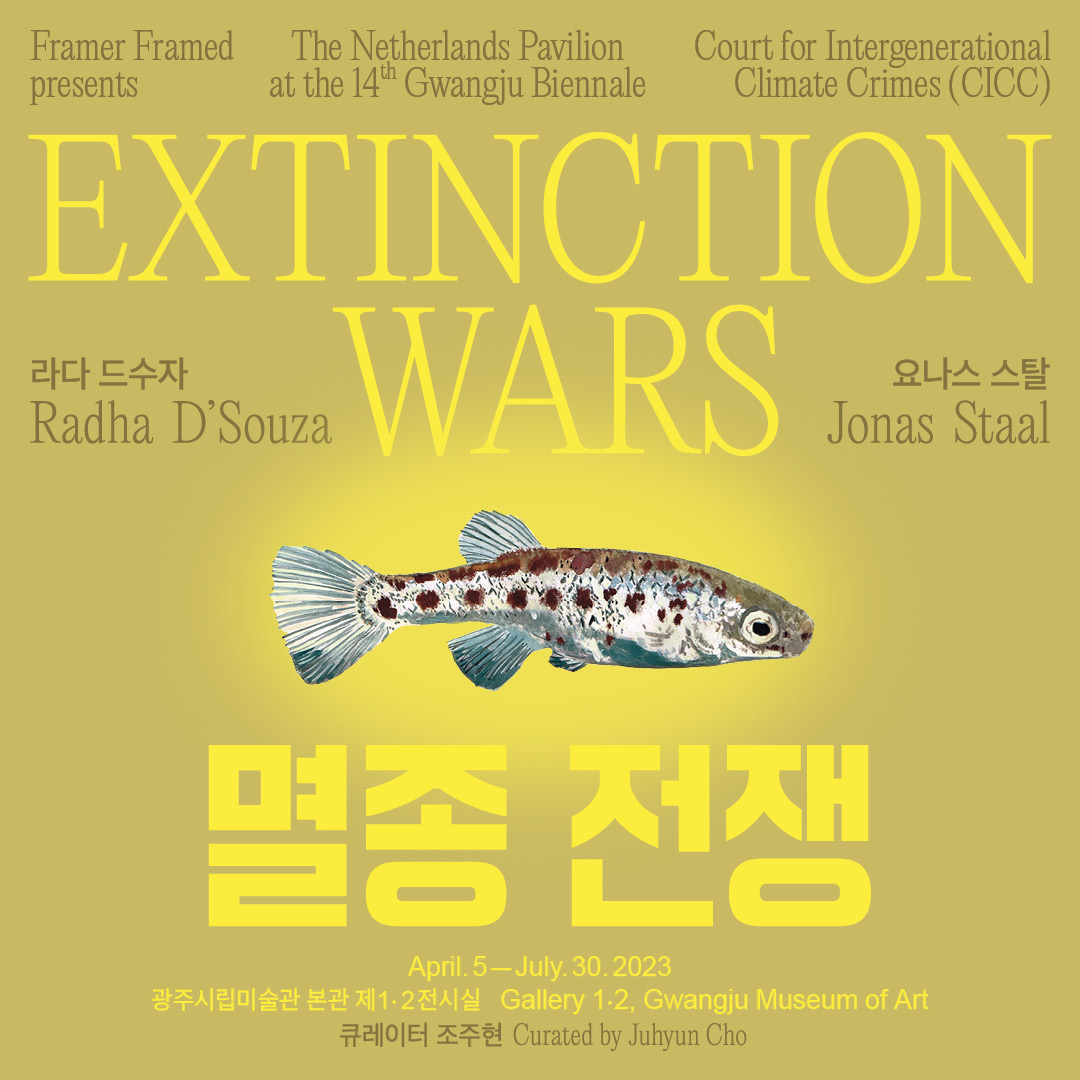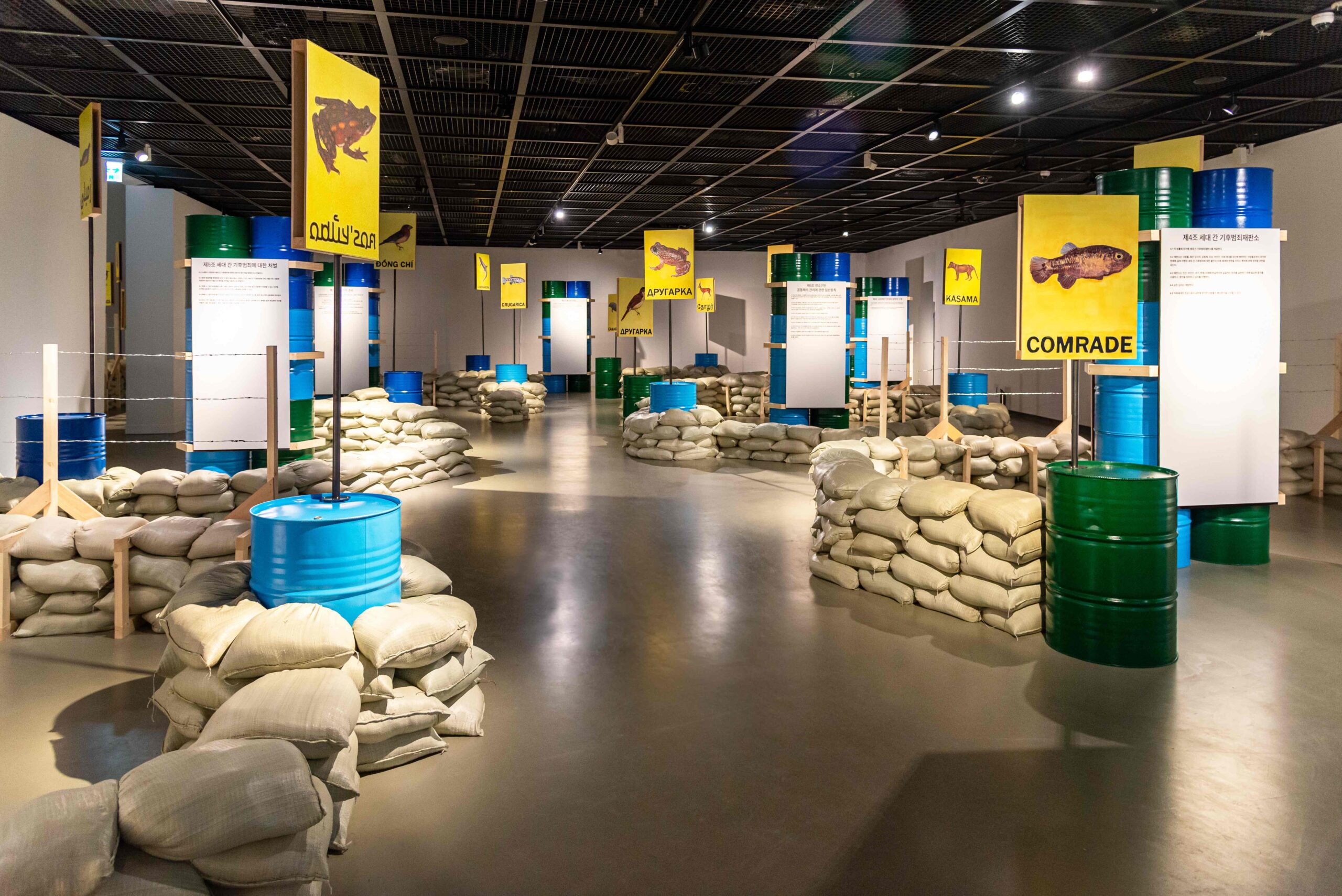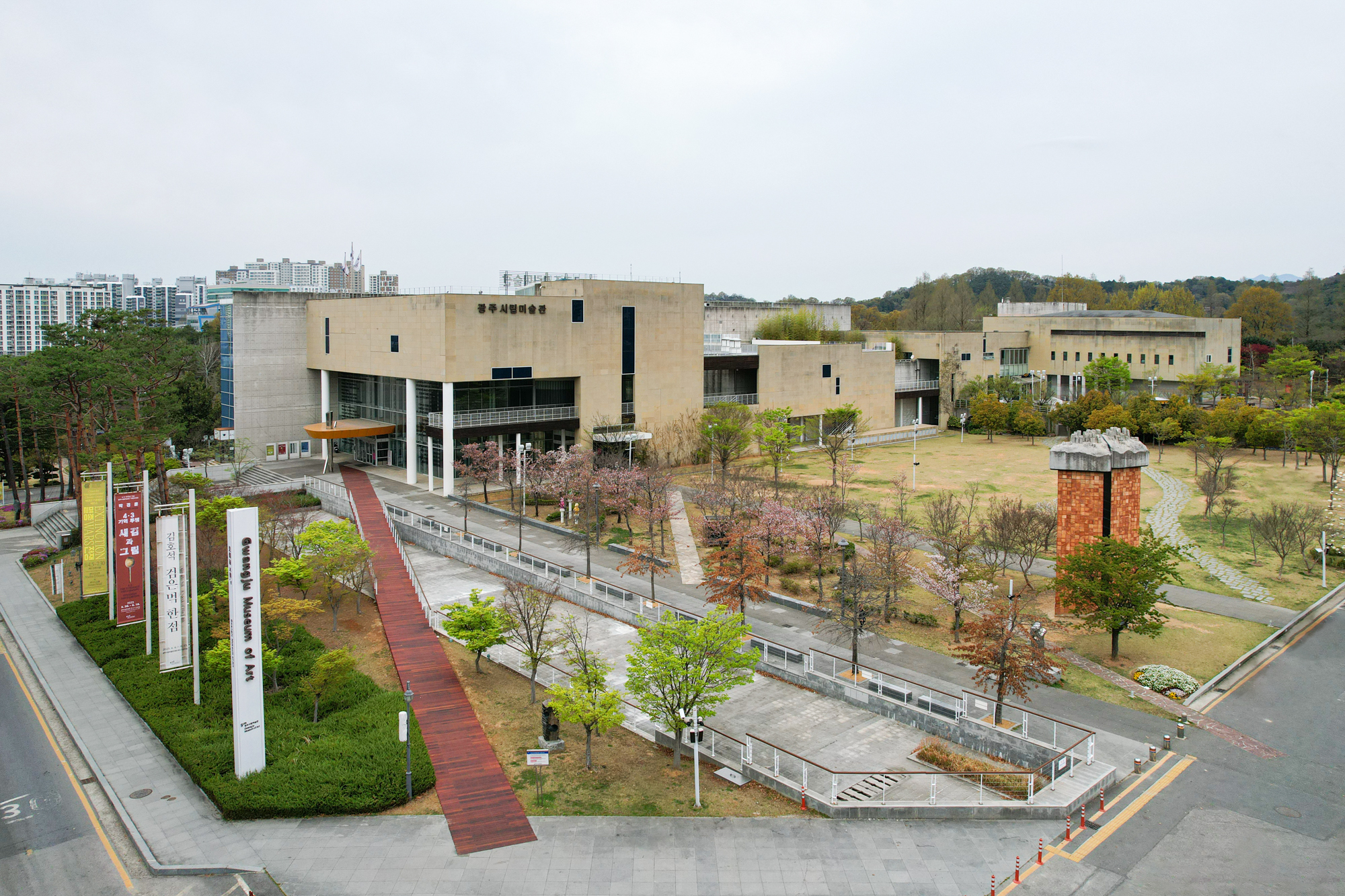Evidentiary Hearings: CICC - Extinction Wars at the Gwangju Biennale
Visit the event page to read more about the cases for each day and the organisations presenting evidence.

Writer, academic, lawyer, and activist Radha D’Souza and artist and propaganda researcher Jonas Staal are the co-founders of the Court for Intergenerational Climate Crimes (CICC): an alternative tribunal that prosecutes states and corporations for their complicity in climate crimes past, present and future.
Presented by Framer Framed as the Netherlands Pavilion in the Gwangju Museum of Art at the 14th Gwangju Biennale, D’Souza and Staal have created a new iteration of the CICC on the subject of “Extinction Wars.” Against the backdrop of ongoing wars in Korea, Southeast Asia, and internationally, the very existence of the military-industrial complex itself, the artists argue, should be considered a climate crime. The Court will be open for general visitation between 5 April and 30 July 2023. On 7, 8, and 9 April you can join public hearings at the CICC to listen to prosecutors and witnesses from various social movements and activist organisations testify to the role of states and corporations in perpetuating climate war crimes, specifically in the context of Korea.
Capitalism and colonialism are possible only by waging military campaigns against natures and peoples in the past, present and future. The annihilation of these living worlds of human, animal, and plant communities over the past 500 years constitute extinction wars. This is the central proposition of the exhibition and series of evidentiary hearings which introduces the project Court for Intergenerational Climate Crimes, or “CICC,” by academic, writer, lawyer and activist Radha D’Souza and artist Jonas Staal, curated by Juhyun Cho, at the Netherlands Pavilion of the 14th Gwangju Biennale, co-commissioned and co-produced by Framer Framed, Amsterdam. In an immersive installation comprising of military frontlines constructed from sandbags, oil barrels, and barbed wire, D’Souza and Staal present an alternative court to prosecute climate crimes perpetuated by states and corporations with an emphasis on the military industrial complex in the Republic of Korea.
The first waves of mass extinctions amongst human communities, and the animal and plant life that thrived with them, began during the colonial period. Colonialism and its military apparatus turned living worlds into property and commodities, a transformation made possible by colonial law. In this light, the climate crisis is a colonial crisis that has been ongoing for the past 500 years – aided and abetted by dominant institutions established by law, and the imaginaries that envisioned them. The images of animals and plants made extinct that emerge from the frontlines of sandbags, oil barrels, and barbed wire in the CICC: Extinction Wars installation in Gwangju, are evidence of that long history of climate criminality that continues to define our present as well as the possibility of liveable futures. However, their presence is also a call to recognize them not as products or commodities, but as non-human ancestors, as comrades even. Against the frontlines of the extinction wars waged by the military industrial complex, it is time to hold our ground, water, soil, and set up our own frontlines in defense of living worlds for all.
The CICC: Extinction Wars at the Gwangju Museum of Art consists of four rooms with large-scale installations and video. Read more about each room's display in the Hand-Out below.
Curator & Researcher
Artists:

Download
The Gwangju Biennale Pavilion will take place alongside the Gwangju Biennale’s main exhibition, soft and weak like water, with the nine participating cultural organisations working on their exhibitions in cooperation with pre-allocated culture and art institution counterparts in the Gwangju area.
Initiated in 2018, the Pavilion involves exhibitions from prominent international cultural organisations to break down borders between different art environments and communicate a message unique to the city of Gwangju. With three organisations represented at the 12th Gwangju Biennale in 2018 and two at the 13th Gwangju Biennale in 2021, this year’s Pavilion will be the largest yet, with arts and culture organisations from nine different countries. The Netherlands Pavilion, co-produced by Framer Framed, is held at the Gwangju Museum of Art.

On 7, 8, 9 April 2023, the Court for Intergenerational Climate Crimes at the Gwangju Museum of Art will hear complaints brought by comrades of the Korean peninsula against the Republic of Korea and transnational corporations registered therein. These evidentiary hearings of the CICC will take place at the Netherlands Pavilion of the Gwangju Biennale, hosted by the Gwangju Museum of Art and co-produced by Framer Framed, Amsterdam.
Comrades of the Korean peninsula will testify to the intergenerational climate crimes committed by the Republic of Korea in collusion with its transnational corporations against natures and peoples and demand justice for past, present, and future generations of human, animal, and plant communities.
The hearings will consist of witness testimonies by campaign groups, researchers, and experts, overseen by a panel of three judges. Under the title Extinction Wars, the testimonies will highlight the relationship between intergenerational climate crimes and the military-industrial complex, (neo)colonialism, environmental degradation, and mass displacement of people and ecologies.
The hearings will be conducted by a panel of three judges. Ms. Ryu Jung Hwa is an attorney, practising in diverse areas related to public interests. Ms. Ji Hyun-Young is an attorney specialising in environmental policy. Radha D’Souza, who will be the presiding judge, is a legal academic in London and formerly practising attorney in Mumbai, India. The public is invited to join the proceedings as members of the jury. As members of the jury, they will be invited to decide on the complaint after hearing the evidence.

Since its establishment in 1992, the Gwangju Museum of Art strives to provide diverse cultural experiences for the public. The museum also was instrumental in building the foundations for the opening of the Gwangju Biennale, in 1995. Newly relocated to Jungoe Park in 2007, the Gwangju Museum of Art collaborates with the Asia Culture Center and prominent museums all around the world for enrichment of local culture and arts.
First launched in 2018, the Gwangju Biennale Pavilion aims to promote exchange between local and international art and cultural institutions. It serves as an international platform for artistic and cultural exchange and promotion, introducing notable artists and curators from around the world as well as local institutions. This year, it will feature works from the world’s most active artists and curators, showcasing diverse types of contemporary art to the public. During the 14th Gwangju Biennale, taking place from April 7 to July 9, the Gwangju Biennale Pavilion will take visitors through a vivid scene of contemporary art in addition to the main exhibition soft and weak like water.

News Penguin - Who is the climate sinner? (누가 '기후'죄인인가)
News Penguin - A world without climate crime and ecocide, not a dream but the only reality (기후범죄·생태학살 없는 세상, 이상 아닌 유일한 현실)
Pressian - An alternative to the climate crisis that communicates with the body, not language (언어가 아닌 몸으로 소통하는 기후위기 대안)
Korean Times - Bringing climate crimes to court
e-flux Criticism - 14th Gwangju Biennale, “soft and weak like water”
Co-founders & Directors of Framer Framed:
Josien Pieterse (요신 피터서)
Cas Bool (카스 볼)Curator & Researcher:
Juhyun Cho (조주현)Artists:
Radha D’Souza (라다 드수자)
Jonas Staal (요나스 스탈)Co-programmer Public Hearings, Framer Framed:
Jiyoung Kim (김지영)Production Coordination, Studio Jonas Staal:
Nadine Gouders (나딘 하우더스)Architect:
Paul Kuipers (폴 카우퍼스)Graphic Design:
Hayoung Im (임하영)
Dinara Vasilevskaia (디나라 바실레브스카야)Installation Construction:
Chang-yeon Pyo (표창연)Production Manager:
Yena Ku (구예나)Research & Communication, Framer Framed:
Hahae Son (손하혜)Communication, Framer Framed:
Stefan Wharton (스테판 와르턴)
Hosted by Gwangju Biennale Foundation, Gwangju Metropolitan City
Co-commissioned and co-produced by Framer Framed in collaboration with the Gwangju Biennale Pavilion
In cooperation with the Gwangju Museum of Art
Supported by Arts Council Korea (ARKO), the Ministry of Education, Culture and Science (Netherlands), Amsterdam Fund for the Arts (AfK), the Embassy of the Kingdom of the Netherlands in Korea, and the Mondriaan Fund
We are grateful to the following individuals for their help and advice:
Gwangju Biennale Foundation
Yangwoo Park, PresidentGwangju Museum of Art
Gilhyun Byun, Chief CuratorEmbassy of the Kingdom of the Netherlands in Korea
Joanne Doornewaard, Ambassador